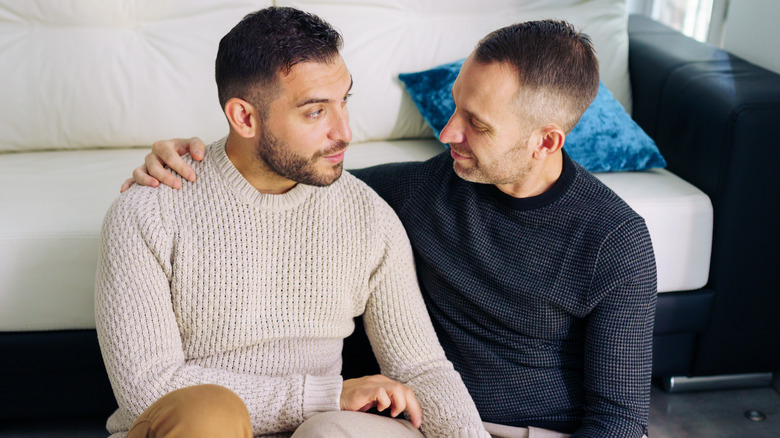What To Do If Your Partner Is Body Shaming You
One of the wonderful things about romantic relationships is the security that comes from having finally found your person in the world. The mutual support and encouragement present in a healthy union are meant to make navigating the uncertainties of life easier and even more enjoyable.
Respect, open communication, fairness, and the ability to be your true self are all cornerstones of any good relationship, per Verywell Mind. You may have heard people talking about what you should be doing if you're ever fat-shamed by strangers, but have you given any thought about body shaming in the context of an intimate relationship?
According to Psych Central, if someone makes negative remarks about your appearance — whether they be directed at your size, age, or general attractiveness, this is viewed as body shaming. Body shaming can manifest as subtle or blatant comments that can make you feel less desirable and self-conscious (via Jay Shetty). So, what can you do if you find yourself being body shamed by your significant other?
Try and figure out the intention behind their words
Understanding the intention behind your partner's comments might be a good first step. If your significant other is genuinely worried about your health, then you may want to consider what they're saying, according to Date Convo. In particular, if there's concern and love behind their words, no matter how painful it is to hear them, they might be worth taking seriously, adds Innovative Match.
However, according to clinical psychologist Samantha DeCaro, Psy.D., even concern for your loved one's health could be communicated in a different way, as she told Bustle. "If you are truly concerned for your partner's health, do not focus on weight. There are many ways to improve health and engage in health-promoting behaviors without intentionally manipulating the shape or size of the body," DeCaro advised.
If you're being made to feel insecure by how your partner is bringing up your appearance, or if nagging and insults are involved, then it's time to speak to them firmly about how you feel (via Innovative Match).
Talk to your partner about how you feel
The effects of body shaming are real on anyone who is on the receiving end of it. Even Camila Cabello shared an inspiring message about body image as a result. While it's entirely possible that your significant other isn't intending to be hurtful, it's still very important to clarify your position and to also express yourself clearly through communication, per Date Convo.
Further, how your partner reacts to this conversation will also clue you into their intentions — they might be apologetic and kind or act aloof and try to brush it off. Choosing to ignore body shaming comments will only cause you to accumulate resentment for your spouse over time, as Health Shots warns, so it's best to sit down with them and tell them honestly how their comments make you feel.
There are things you should say to your partner every day and body-shaming comments definitely don't fall into that category. If you don't wish to go on a diet or lose weight, let your significant other know how you feel, as Innovative Match advises, and stay strong. Weight loss and gain are individual journeys that are best done when the person is motivated to do it for themselves, not for someone else.
Realize that your partner's perception isn't everything
According to clinical mental health counselor Dani Bryant, speaking to Bustle, your partner's bad behavior might be shaped by their own negative experiences. "Body-shaming comments that a partner might make are often a reenactment of a similar comment that they have received in other chapters of their life," she offers. Or, they could be a result of unrealistic expectations fueled by watching too much porn (via Innovative Match).
Body confidence coach Judi Craddock of Heart Your Body also writes that "Body critical people judge themselves and others very harshly." While these are in no way excuses for a partner's remarks, they are helpful indicators of how important it is to love yourself and to shy away from society's ideals of what beauty is. Hold space for your emotions, and for how your partner's words and actions have made you feel, notes clinical psychologist and sex therapist Dr. Nazanin Moali.
Per Oasis 2 Care, she also shares, "Recognize that whatever their current opinion does not reflect reality." You are considerably more than the way you look.
Take a stand and set some boundaries if necessary
It's important to protect your mental and emotional health in a relationship. Clinical mental health counselor and body liberationist Dani Bryant explained to Bustle, "If we are told that our worth and value is in our body size, then we will continue to seek out and repeat the pattern until we understand that it is a pattern." Hold your partner accountable and ask them to change the way they speak to you if necessary.
Dr. Nazanin Moali stressed, "Request specific behavior changes if needed" (via Oasis 2 Care). Further, clinical psychologist Samantha DeCaro told Bustle that it's also important to prepare for how you're going to move forward if your significant other doesn't respect your wishes. If they're not open to having a frank discussion, it might be a sign that you could benefit from seeing a couples therapist together, per Oasis 2 Care.
You may need to take a hard look at your relationship
If your frank and honest conversation with your partner doesn't bring about the requisite changes in how your partner is addressing you, then "You might need to question if you feel happy, safe, and fulfilled in the relationship," says body confidence coach Judi Craddock, of Heart Your Body. Understanding what you deserve within a loving relationship — understanding, love, and respect, above all else — and refusing to settle for it can go a long way in deciding if you want to move on from your current partner or stay where you are.
While it's entirely possible to turn things around and come to a place of mutual respect, there are also instances where leaving is the only healthy option, as Date Convo notes. Your mental and emotional health is more important than staying in an abusive situation. Clinical mental health counselor Dani Bryant informed Bustle, "If [your] partner cannot or will not do the work to try to understand where their own anti-fat biases or unrealistic beauty standards come from, then it's really important for folks to ask the question: How can I maintain any sort of growth or healing in body liberation if one of the closest people in my life is not doing that same work?"
Simply put, your well-being should always come first and if you feel like your partner is negatively affecting it, it's time to take action.





